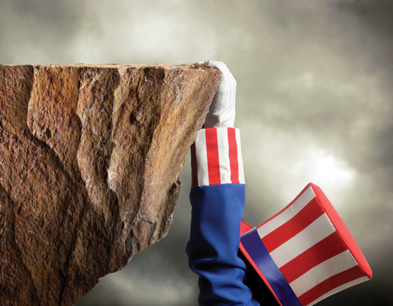
By Steve Brawner
© 2015 by Steve Brawner Communications, Inc.
Question: If the federal government were to reach the point where it couldn’t pay all its bills, who should be paid first?
A. Soldiers
B. Veterans
C. Investors, domestic and foreign, to whom the U.S. government owes money.
If you answered “C,” then you would agree with 24 Republicans on the House Ways and Means Committee. They voted last week to advance legislation that would allow the government to keep borrowing money to pay U.S. Treasury bond investors, even if the government reached its supposed debt limit. Payments to Social Security’s trust funds also would continue.
Unfortunately, all 25 of you would be right. The 15 Democrats who make up a minority of the committee voted no, but that’s politics. If the majority and minority roles were reversed, then the Democrats likely would have done what is necessary to keep the U.S. from defaulting on its obligations for the first time ever.
The topic has come up because Congress once again is approaching one of those entirely foreseeable and often manufactured financial crises that threaten the economy and cause the world to question if the United States still knows what it’s doing.
This time, the federal government will exhaust its ability to borrow money in late October, which means it would reach its debt limit in the weeks that follow. Supposedly, that would mean the government couldn’t create more debt. In reality, it just would mean the government temporarily would stop paying its bills – which, of course, would have to be paid later.
That probably won’t happen. What will probably happen is what almost always happens: In Washington, they’ll posture and threaten and argue right up until the last minute, each side accusing the other of “kicking the can down the road,” the most overused cliche in politics these days. And then they’ll pass some measure that keeps the government running for a while – probably until after the November 2016 elections. And then we’ll be stuck wherever that can stopped rolling.
So why even consider that bill approved by the 24 Ways and Means Republicans? The United States government is considered a very safe investment, which is why taxpayers are paying very low interest rates on the $18.2 trillion national debt. Investors – everyone from middle class Americans to the Chinese government – reason that if anyone will pay their money back plus a little interest, it’s Uncle Sam.
What would happen if investors started to doubt that? A U.S. government default would rattle world markets. Meanwhile, interest rates on the debt would rise because investors would see Uncle Sam as more of a risk and would demand a higher return. More of your tax dollars would go into the pockets of investors, domestic and foreign, to pay for the debt the government has already incurred. Less would be available for soldiers and veterans.
Bad things happen when you don’t pay your bills.
At some point, this nonsense must stop. It’s time for the country to stop tiptoeing up to these fiscal cliffs like a teenager trying to scare his girlfriend, One of these days the rocks will be less steady than they seem, and then … well, let’s not be too dramatic. Let’s just say the kid slips several feet down the slope, sprains his ankle, and barely makes it back up the ledge where his soon-to-be ex-girlfriend is waiting.
There’s a simple reason why this keeps happening: Because the voters tolerate it. In fact, they reward it. Members of Congress know that playing these games probably won’t cost them an election. They can always blame the other party and say they did their best as part of a dysfunctional institution. Voters don’t really expect them to do differently. Meanwhile, if they were really to try to balance the budget – by some combination of spending cuts and tax reform that would increase revenues – they’d risk being voted out. Voters like their government programs, but they don’t want to pay for them.
Ultimately, the investors who are financing the national debt will get their money. So will soldiers and veterans, though not enough.
Also pretty certain is that the costs will be passed on to our children and grandchildren. Kids don’t vote, and they don’t donate money to campaigns. They depend on older generations to look out for their interests.
We’ve all apparently decided not to vote for that.
Very good blog post.Really thank you! Fantastic. eedddagdeeakfbdd